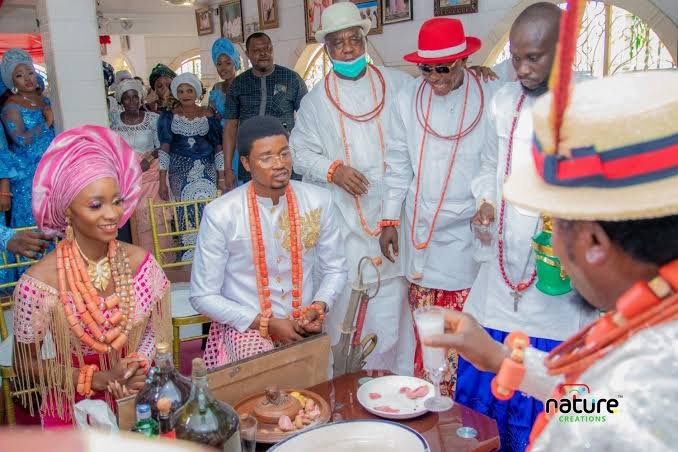Interesting things to know about the Itsekiri ethnic group in Nigeria

In this article, platinumtimes.ng explores the culture, traditions, history and lifestyle of the Itsekiri ethnic group in Nigeria.
The Itsekiri are an ethnic group in Delta State, Nigeria. They occupy the riverine areas of Warri South and Warri North, they speak a Yoruboid kind of language and are traditionally fishermen and skillful traders.
They have a dignified sense of culture and tradition and thus classified as one of the unique and perculiar people in Nigeria.
The Itsekiri land is traditionally called the Warri Kingdom or Iwere and this place is a major centre of Nigeria’s crude oil and natural gas production and petroleum refining and an industrial hub.
Origin
History holds that the Warri Kingdom was founded by Ginuwa, a prince of Benin founded years ago.
It was visited by the Portuguese missionaries in the 15th century and in the 17th century, a Warri prince returned home with a Portuguese wife whose son, Antonio Domingo later became the Olu of Warri in the 1640s.
These interactions between the Itsekiri and the Portuguese missionaries led to the dominance of the Roman Catholic Itsekiri land.
The Itsekiri’s historical capital is Ode-Itsekiri (also called “big warri” or “Ale iwerre”), though the monarch’s main palace is in Warri town the largest city in the area and home to diverse other communities including the Urhobos, Ijaws, Isoko, and many other ethnic groups.
Language
Itsekiri language is assumed to be a Yoruba dialect.
It has also been influenced by the Bini, Portuguese, English and Igala languages due to centuries of interaction with people from those nations.
Population
The Itsekiris are about 2.7 million people and live mainly in the Warri South, Warri North and Warri South West local government districts of Delta State, Nigeria.
Itsekiris can also be found in parts of Edo and Ondo states and in various other Nigerian cities including Lagos, Benin City, Port Harcourt and Abuja.
Many people of Itsekiri descent also reside in the United Kingdom, the United States and Canada.
Beliefs
The itsekiri people communicate with their deities through the Ife oracle. Still they believe in an overall God known as “Oritse”.
Before Christianity was introduced by the Portuguese missionaries, the Itsekiris believed followed an ancestral religion known as Ebura-tsitse which still remains a part of Itsekiri culture.
The introduction of Christianity led to the formation of many christian denominations in Itsekiri land.
Occupation
The Itsekiris are mostly fishermen courtesy of their riverine communities.
Being the home of Nigeria’s crude oil, lots of industries are established here and this adds to the economy of the people.
The Itsekiri people are also good artisans and modern Itsekiris are engaged in white collar jobs both in government and private companies.
Traditions

The Itsekiri people practice a gerontocratic system of governance where elders are chosen as leaders and priests are highly respected.
They are less by a monarch, the Olu and his council of chiefs who constitutes the Political class.
The Itsekiri people have a hierarchy of leadership which includes the Oloyes and Olareajas who make the royal class.
The Omajaja who are the free- born sons and daughters of Itsekiri and the Oton-Eru who are seen as slaves and servants.
Modern Itsekiris see themselves as one regardless of class but still pay respect to their elders.
Culture
Culture us an integral part of any tribe. The Itsekiri culture is engraved in their food, marriages, festivals, dresses etc.
Food
The Itsekiris enjoy palm fruits and seafood as their food.
However, other foods such as Banga Soup, made from palm kernels, and Owo soup made from palm oil and starch both eaten within starch.
Dressing
Traditional outfits for men in Itsekiri land consist of a long sleeved shirt called a Kemeje, a George Wrapper around their waist and a hat with a feather stuck to it.

The women wear a blouse and also tie a George wrapper around their waist. They wear colourful head gears known as Nes (scarf) and coral beads.
Marriage

The Itsekiri Traditional Marriage is usually an arrangement between two families as opposed to an arrangement between two individuals, both families arrange the day the bride price or dowry will be paid. The payment of the dowry by the groom’s family solidifies the marriage union.
